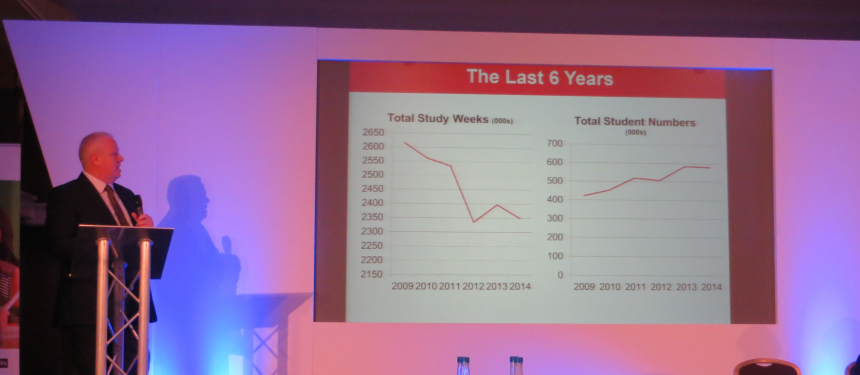The UK’s ELT sector “faced on onslaught in 2014” according to English UK CEO Eddie Byers, who this week reported a decline in both student weeks and numbers for the country’s private and state ELT providers.
News and business analysis for Professionals in International Education
Have some pie!
UK: no reprieve for ELT sector as numbers fall and politics toughen
 EUK CEO Eddie Byers explains how after 2013's bump, the sector saw a return to its downward trend in 2014 Photo: The PIE News
EUK CEO Eddie Byers explains how after 2013's bump, the sector saw a return to its downward trend in 2014 Photo: The PIE News Visa policy and students counted in net migration figures compounded trouble already created by significant drops in key source countries, Byers expounded at the EUK annual conference (#eukac15) in Manchester this week.
“Markets decreasing isn’t a new problem but with market-based issues, like politics and immigration policy, it makes a difficult operating environment for members,” he explained to delegates.
Students declined by 0.83% to 580,618 and student weeks dropped 2.02% to 2,348,116 across both sectors. Numbers from private providers, the majority of EUK members, were even more worrying, showing a 3.3% drop in numbers and a 0.5% drop in weeks.
“Without growth it’s difficult for any business to navigate its way through challenges that it faces”
The private sector took another hit in average course stays, which dropped to 5.25 from 5.47 among adults and 2.76 from 2.91 among young learners. “There are less students in total staying for a shorter time,” observed Byers.
Key markets that saw notable declines include Spain, Russia, Brazil, Turkey and Japan while Italy, Venezuela, Mexico and Saudi Arabia increased.
“The market isn’t moving forward; the market is eroding,” said Byers.”Without growth it’s difficult for any business to navigate its way through challenges that it faces.”
Centres saw a slight jump in numbers in 2013, giving hope that the sector had bounced back from its Olympic slump. However figures from 2014 suggest a continuation of that downward trend.
“After 2013’s uplift, we clearly didn’t turn that corner,” commented Byers.
Now with the reality of a Conservative majority ruling Westminster for the next five years, the sector is bracing for what’s next after half a decade of unfriendly policy that saw the tightening of visa issuance, a crackdown on highly trusted sponsorship, and the overhaul of Secured English Language Test providers.
“I think people came into 2015 hoping that 2015 will be better than the year before because of the issues that have been faced already,” Byers told The PIE News. “I think that’s now a question mark.”
In April the government announced that only IELTS and Trinity College London exams would be accepted for Tier 4 student visa applications and decreased the number of testing sites worldwide from around 1,000 to a few more than 100.
The transition has left UK ELT providers with concerns about capacity and a decline in business as former IELTS test centres have seen test taker numbers drop as students opt to take IELTS for visa purposes at specific locations.
“Most of us view with extreme scepticism that there is room for capacity in the new SELT system,” commented Timothy Blake, Chief Executive of London School of English, while another delegate referred to the situation as as a “car crash waiting to happen”.
Byers said that overall members have reported some “teething problems” but is waiting to see how far the impact will reach. “We’ll have to see if that materialises into something more significant as of yet. I’m definitely concerned about it and keeping a very close eye on it.”
However, he said the EU referendum set to take place some time in the next two years will be the sector’s biggest obstacle.
“Most of us view with extreme scepticism that there is room for capacity in the new SELT system”
“If you take the view that 50% of the UK industry is based on European students then that is clearly the single biggest challenge. That’s not to say the other things are unimportant, but that’s the major strategic challenge that we face.”
EUK’s strategy for the coming year includes commissioning independently verified economic research to show government the value of the ELT sector as well as efforts to cut red tape by lobbying for the Accreditation UK scheme to confer with Tier 4 status.
“We’re not trying to do anything radically new, what we’re trying to do is fine-tune our approach to take account of these times and do it better in the future than we have in the past,” said Byers.
“That’s not to say that we don’t think the organisation and the sector has been successful in the past, it’s just that we think now there are new things that need to happen but there are developments of what we’ve already been doing. It’s a continuation of what we’ve done before and trying to do it better.”
Still looking? Find by category:



4 Responses to UK: no reprieve for ELT sector as numbers fall and politics toughen